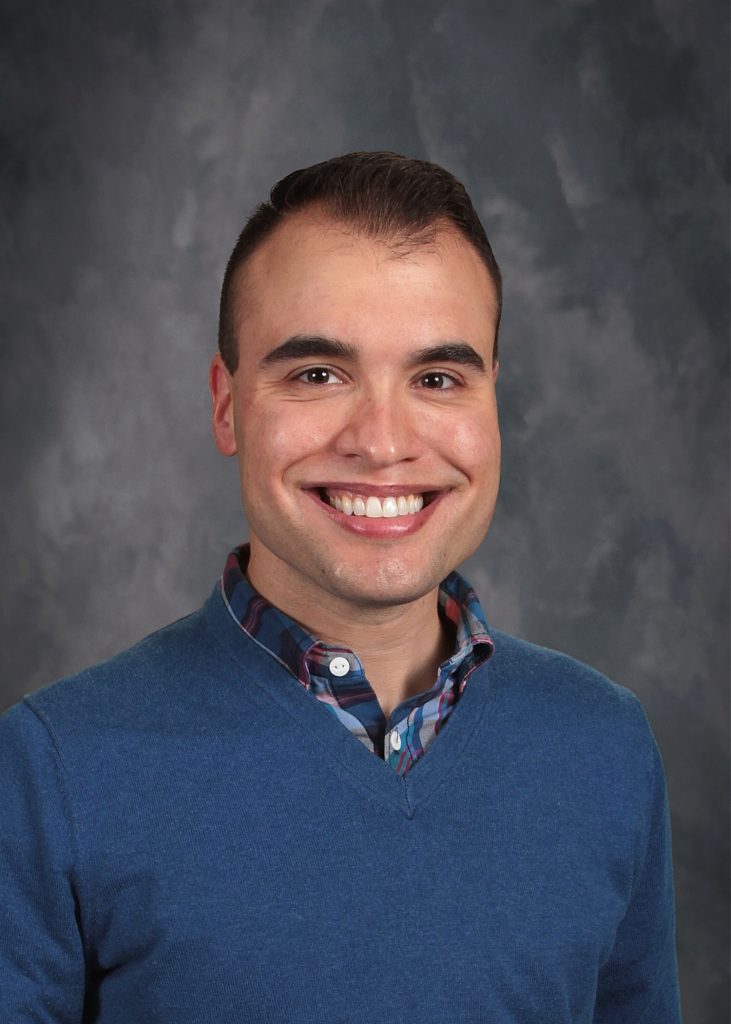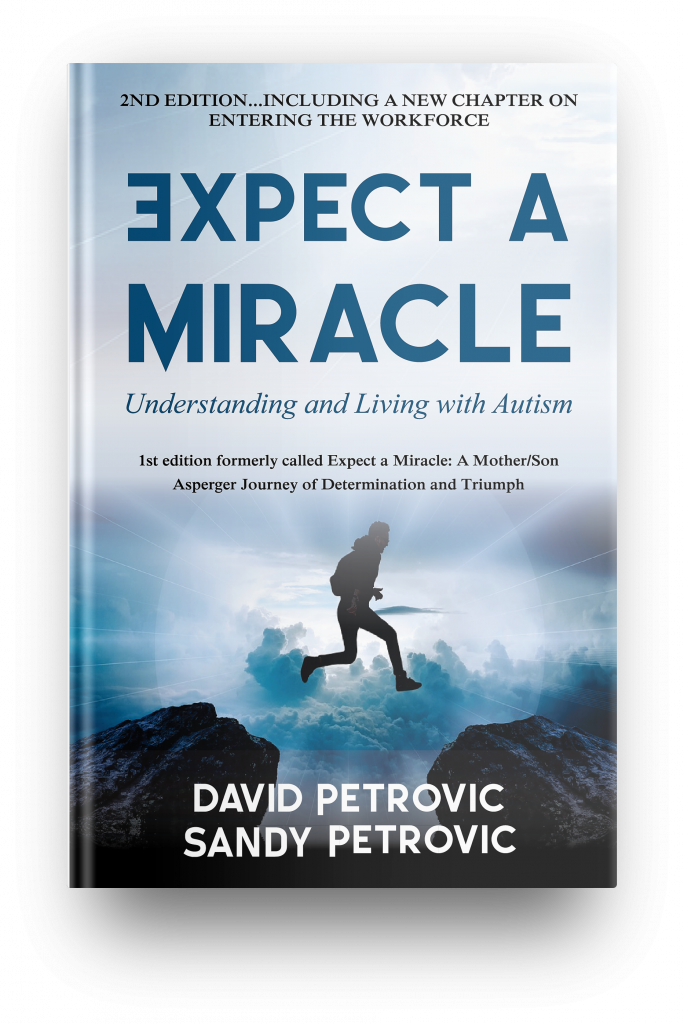

Twenty-eight-year-old David Petrovic, BA, MAT is an author and national speaker. He is an employed middle school teacher certified in language arts and social studies. David recently earned a Master of Arts in Theology with a Pastoral Theology Specialization. He aspires to teach high school, and he is considering a vocation with the Catholic clergy. His passion is theatre, and his most exciting recent achievement is moving into his own apartment, now living independently. He blogs at Aspergers Miracles and can also be found on Facebook. This week he shared his growth and experiences as an autistic advocate, author, and public speaker.
How did you first become aware of your autistic identity? Was it presented as positive? Negative? Neutral?
My parents always talked openly about autism and the various therapies they took me to, but I was never able to connect the dots of my autistic identity until I attended a sleepaway camp my sixth-grade summer. By the conversations of my fellow cabinmates, I quickly learned that they all had autism. Surprised, I assumed that I must be autistic too. On the car ride home, I was able to confirm this, and my parents were shocked to discover that I had been oblivious to it prior to camp. Their past explanations hadn’t been concrete enough for my comprehension. We spoke of the positives, and I wasn’t really phased by the revelation after my questions were answered.
It wasn’t until I left my special-needs school to be mainstreamed in the eighth grade that reality hit me about my differences. As I got further into my adolescence, I went through stages of grief, denial, and anger because I just wanted to be like everyone else. With the help of my renewed social skills therapy, a pediatric psychologist, and family support, I was able to learn about how my autism affected me and why I did the things that I did. It was presented in a very positive way that helped my self-esteem. I learned how to accept it, explain it to others, and advocate for myself. I began to focus on my strengths instead of on my challenges, and I ultimately came to embrace and love the whole of my being.
Tell me about your co-authored book, Expect a Miracle: Understanding and Living with Autism. Why did you write it and what do you hope readers gain from it?
The simple reason for writing the book is that we wanted to instill hope. There are many books on autism, but we aimed to provide a unique spin coming from the perspectives and hearts of a person and parent living it. No matter what phase of life you are in, we wanted to validate the worth and value that lies within every single human being. We wanted to dismantle prejudgments based on physical characteristics so that people realize and appreciate the gifts and complexities that lie beneath the surface of every person. We aspired to provide a deeper understanding and compassion for autistic people to aid in opening doors for better inclusion and improved quality of life. We hoped that our strategies and experiences might give readers ideas and inspiration to help them with their challenges.
The book covers every developmental stage from toddlerhood through young adulthood and includes topics such as college readiness and employment. Our book is unique in that it was written for autistic individuals and their families as well as all those who play a role in strengthening their development i.e., teachers, counselors, therapists, employers, co-workers, and loved ones. The title does not imply that I am on a pedestal—you will have to read the book to find out why it is so named.
How did you become passionate about public speaking? What topics do you most enjoy talking about?
I attended a Catholic high school and had a very rough start there. Amidst a tough period my junior year, and searching for fulfillment, I volunteered to help with retreat events for the underclassmen. In response to a general invitation to tell my story, and with the hopes of getting other students to open up, I stood up and expressed a bit about what it was like to be mistreated and feel down. I then expressed my hope that others there would treat peers with the respect and kindness that each person is entitled to. After that retreat, the campus minister stated that she was amazed by my ability to reach others, and she encouraged me to pursue motivational speaking more seriously. Going into my senior year, she then requested me to speak to the incoming first-year students. That was my first autism presentation with more details about the hardships I endured, as well as being bullied. Not only were the freshmen visibly moved, but so were the seniors who helped on the retreat committee. By the end of my senior year, these treasured acquaintances became my friends, no first-year students were bullied (that I was aware of), and I began speaking to neighboring schools, churches, and groups. This exploded after our book was published.
I speak on a wide range of topics. I like to think that the way I customize the presentations to requests makes me a unique speaker—it requires a lot of extra time. I in-service teachers on reaching autistic students and others who learn differently. I speak to parents, colleges, counselors, health care professionals, religious groups, and even within college classrooms. In fact, our book has become a required read in several courses to enlighten future professionals in autism-related fields. I have recently expanded to corporate groups to speak of the value and untapped potential of autistic employees, including how to accommodate their needs to help them achieve their maximum potential.
But my favorite audience that holds a special place in my heart is the youth/teen demographic. It is one reason I became a middle school teacher. I wanted to do for youth what my campus minister did for me—in other words, validate for them that they have worth, purpose, and value. I speak to students about the effects of being bullied, immediately and long term. I explain autism to help show them that there is more to a person than what meets the eye, regardless of their differences. I help explain the value of diversity, the value in adversity, and that no one’s life is without its share of hardships, even if that life seems perfect on the outside. I stress that asking for help is the key to success at any age, whether physically, mentally, or emotionally.
Your website mentions that in your Bully Prevention Initiative you discuss “putting a positive spin on negative realities.” Can you give an example of this?
Instead of speaking of anti-bullying, I prefer to focus on pro-compassion (the DO’s instead of the DONT’s). I believe that it is not just about punishment for the perpetrators, it is about enlightening them, helping them realize how their actions affect others, and bringing to light their own struggles. I believe that if everyone can be filled with understanding for others’ differences and can embrace diversity in all its forms, especially within themselves, then bullying would cease. If I can intervene early, and teach the value of treating others with kindness, then we wouldn’t need to discuss the gloomy and pessimistic topics of bullying.
What does an inclusive classroom/school look like to you?
To me, an inclusive classroom entails having students with every special need as part of the group, making it truly integrated. But, along with that, it’s having unlimited access to professionals and avenues to meet students where they are and to support them where they want to go. It is taking the time and putting forth the effort to truly get to know your students and what they need. It is a customized approach to each individual, including neurotypicals. Obviously, this is not possible for one teacher to do on their own.
What are some critical factors to helping youth/teens develop a positive autistic identity?
I believe it must start with the person developing an understanding of what autism is and how it impacts them, since everyone on the spectrum is different. For me, I had to understand it before I could accept it, and I had to accept it before I could explain it to others. It comes down to not thinking poorly of oneself and believing that you can do well. No matter who you are or what differences or challenges you have, one must be willing to work hard to overcome obstacles. All of us, neurotypical and exceptional alike, are a combination of strengths and weaknesses. My advice to autistic teens? Spend more time recognizing and embracing strengths than dwelling on difficulties and then use these strengths. Find out which strategies work best for you to learn and accommodate, which inevitably comes with a lot of trial and error. Seek out help from every avenue and advocate for what is needed to do your best. Even the smallest success increases motivation. Build on successes. Don’t be embarrassed, don’t make excuses, and never give up.
